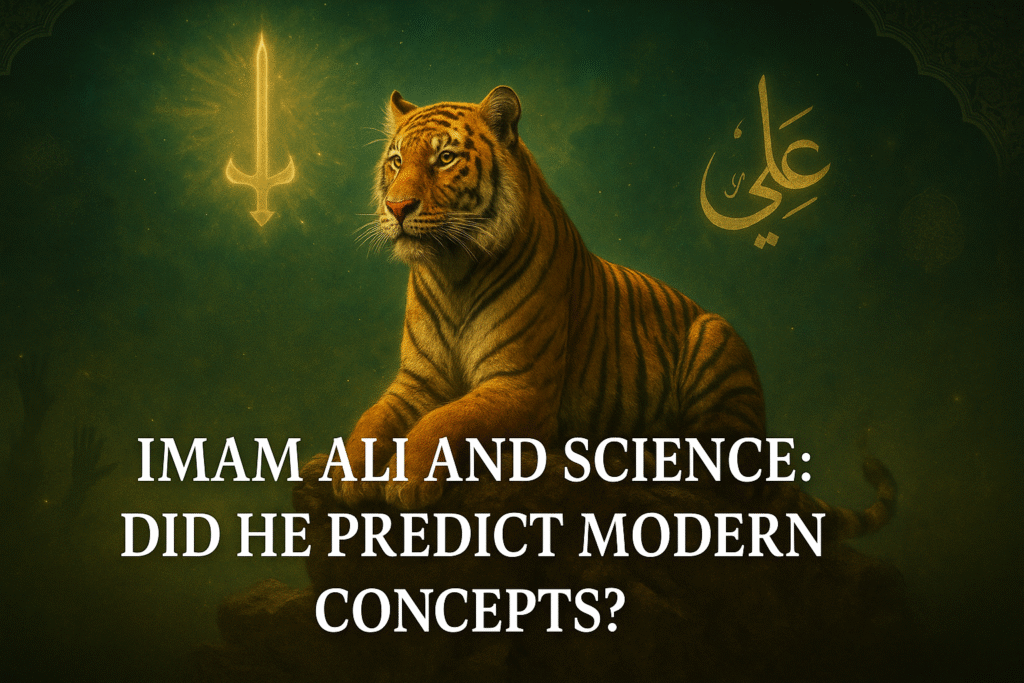Table of Contents
- Introduction
- Imam Ali (a.s): A Source of Divine Knowledge
- Science in the Words of Imam Ali
- a. The Concept of Atoms
- b. Astronomy and the Universe
- c. Human Biology and Creation
- Nahjul Balagha: A Scientific Treasure
- Imam Ali’s Knowledge vs. Modern Discoveries
- Views of Scholars and Scientists
- Supplications Reflecting Cosmic Awareness
- Faith, Science, and Spiritual Wisdom
- Conclusion: The Light of Ali (a.s) in the Age of Reason
Introduction
Was it possible that in the 7th century, a man could speak of the atom, the expanding universe, and human embryology? For many, Imam Ali ibn Abi Talib (a.s) was not only the gateway to spiritual wisdom but also a voice of scientific foresight. In this article, we explore whether the profound words of Imam Ali (a.s) reflect knowledge that aligns with or even predicts modern scientific discoveries.
Imam Ali (a.s): A Source of Divine Knowledge
Imam Ali (a.s) was known as the City of Knowledge, with Prophet Muhammad (PBUH) famously saying:
“I am the city of knowledge, and Ali is its gate.”
This divine endorsement underscores Imam Ali’s unmatched access to both spiritual and worldly wisdom.
Science in the Words of Imam Ali
a. The Concept of Atoms
In a time when science was in its infancy, Imam Ali (a.s) described atoms and their structure:
“Inside every particle, there is a world…”
This aligns with modern atomic theory, which confirms that atoms are made up of subatomic particles (electrons, protons, and neutrons) and that immense complexity exists even in the tiniest units.
Astronomy and the Universe
Imam Ali (a.s) spoke about the movement of celestial bodies and the vastness of the universe:
“Do you think you are a small body, while the universe is folded within you?”
This quote resonates with cosmic relativity and the idea of human beings as microcosms. Some also interpret his words as precursors to ideas about space-time and the expansive nature of the cosmos.
Human Biology and Creation
In Nahjul Balagha, Imam Ali (a.s) describes stages of human development:
“From a drop of semen, to a clot, to a lump of flesh…”
This description mirrors what modern embryology confirms, centuries before the microscope or medical anatomy texts existed.
Nahjul Balagha: A Scientific Treasure
Nahjul Balagha, a compilation of Imam Ali’s sermons, letters, and sayings, is not just a spiritual guide but a philosophical and scientific marvel.
Topics discussed include:
- The formation of the universe
- The origin of life
- The purpose of existence
These insights show a cosmic awareness rarely found in literature of the time.
Imam Ali’s Knowledge vs. Modern Discoveries
- Gravity: While Imam Ali (a.s) did not define gravity, his discussion of the balance and order of celestial bodies reflects deep cosmic understanding.
- Matter and Energy: His references to light, motion, and creation echo principles now discussed in physics and metaphysics.
Quote:
“The heavens and the earth stand firm due to His command.” This shows awareness of universal laws sustaining cosmic order.
Views of Scholars and Scientists
Many Muslim scientists and scholars have referred to Imam Ali’s (a.s) words as evidence of divine knowledge:
- Dr. Ali Shariati emphasized the depth of Nahjul Balagha in philosophical and natural sciences.
- Contemporary Islamic thinkers see Imam Ali’s thoughts as compatible with the findings of quantum physics and astronomy.
Supplications Reflecting Cosmic Awareness
Imam Ali (a.s)’s Munajat (whispers) and Du’as often include references to the order and beauty of creation:
“O the One who arranged the stars in precise orbits…”
These supplications show an intimate understanding of both the Creator and His creation.
Faith, Science, and Spiritual Wisdom
Imam Ali (a.s) never divided science from faith. For him, knowledge was a single entity, whether it dealt with the soul or the stars.
Key Takeaways:
- Science and faith are not contradictory.
- Imam Ali (a.s) exemplified a holistic intellect—grounded in revelation and observation.
- His insights encourage Muslims to pursue knowledge in all fields.
Conclusion: The Light of Ali (a.s) in the Age of Reason
The legacy of Imam Ali (a.s) is not confined to the battlefield or the pulpit. It extends into the stars, into the atom, and into the human soul. His sayings continue to inspire scientists, scholars, and seekers of truth. Whether or not he “predicted” modern science, one thing is certain: Imam Ali (a.s) opened doors to understanding the universe not just with reason, but with divine light.

